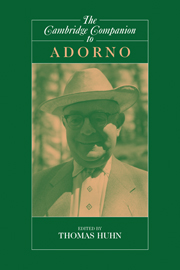Book contents
- Frontmatter
- Introduction: Thoughts beside Themselves
- 1 Negative Dialectic as Fate
- 2 Weighty Objects
- 3 Adorno, Marx, Materialism
- 4 Leaving Home
- 5 Is Experience Still in Crisis? Reflections on a Frankfurt School Lament
- 6 Mephistopheles in Hollywood
- 7 Right Listening and a New Type of Human Being
- 8 Authenticity and Failure in Adorno’s Aesthetics of Music
- 9 Dissonant Works and the Listening Public
- 10 Adorno, Heidegger, and the Meaning of Music
- 11 The Critical Theory of Society as Reflexive Sociology
- 12 Genealogy and Critique
- 13 Adorno’s Negative Moral Philosophy
- 14 Adorno’s Social Lyric, and Literary Criticism Today
- 15 Adorno’s Tom Sawyer Opera Singspiel
- Select Bibliography
- Index
5 - Is Experience Still in Crisis? Reflections on a Frankfurt School Lament
Published online by Cambridge University Press: 28 May 2006
- Frontmatter
- Introduction: Thoughts beside Themselves
- 1 Negative Dialectic as Fate
- 2 Weighty Objects
- 3 Adorno, Marx, Materialism
- 4 Leaving Home
- 5 Is Experience Still in Crisis? Reflections on a Frankfurt School Lament
- 6 Mephistopheles in Hollywood
- 7 Right Listening and a New Type of Human Being
- 8 Authenticity and Failure in Adorno’s Aesthetics of Music
- 9 Dissonant Works and the Listening Public
- 10 Adorno, Heidegger, and the Meaning of Music
- 11 The Critical Theory of Society as Reflexive Sociology
- 12 Genealogy and Critique
- 13 Adorno’s Negative Moral Philosophy
- 14 Adorno’s Social Lyric, and Literary Criticism Today
- 15 Adorno’s Tom Sawyer Opera Singspiel
- Select Bibliography
- Index
Summary
Let me begin with two quotations:
The identity of experience in the form of a life that is articulated and possesses internal continuity - and that life was the only thing that made the narrator's stance possible - has disintegrated. One need only note how impossible it would be for someone who participated in the war to tell stories about it the way people used to tell stories about their adventures.
The war is] as totally divorced from experience as is the functioning of a machine from the movement of the body, which only begins to resemble it in pathological states. . . . Life has changed into a timeless succession of shocks, interspersed with empty, paralyzed intervals. . . . The total obliteration of the war by information, propaganda commentaries, with cameramen in the first tanks and war reporters dying heroic deaths, the mishmash of enlightened manipulation of public opinion and oblivious activity: all this is another expression for the withering of experience, the vacuum between men and their fate, in which their real fate lies.
For those conversant with the history of Critical Theory, the lament expressed in these two citations will immediately sound familiar.If asked to identify their source, they would be likely to point to Walter Benjamin’s celebrated essay of 1936, “The Storyteller,” in which the First World War is blamed for starting a process that has impoverished something called experience (Erfahrung, not, for reasons to be discussed shortly, Erlebnis). It is here, after all, that one finds these now familiar lines: “For never has experience been contracted more thoroughly than strategic experience by tactical warfare, economic experience by inflation, bodily experience by mechanical warfare, moral experience by those in power.”
- Type
- Chapter
- Information
- The Cambridge Companion to Adorno , pp. 129 - 147Publisher: Cambridge University PressPrint publication year: 2004
- 7
- Cited by

